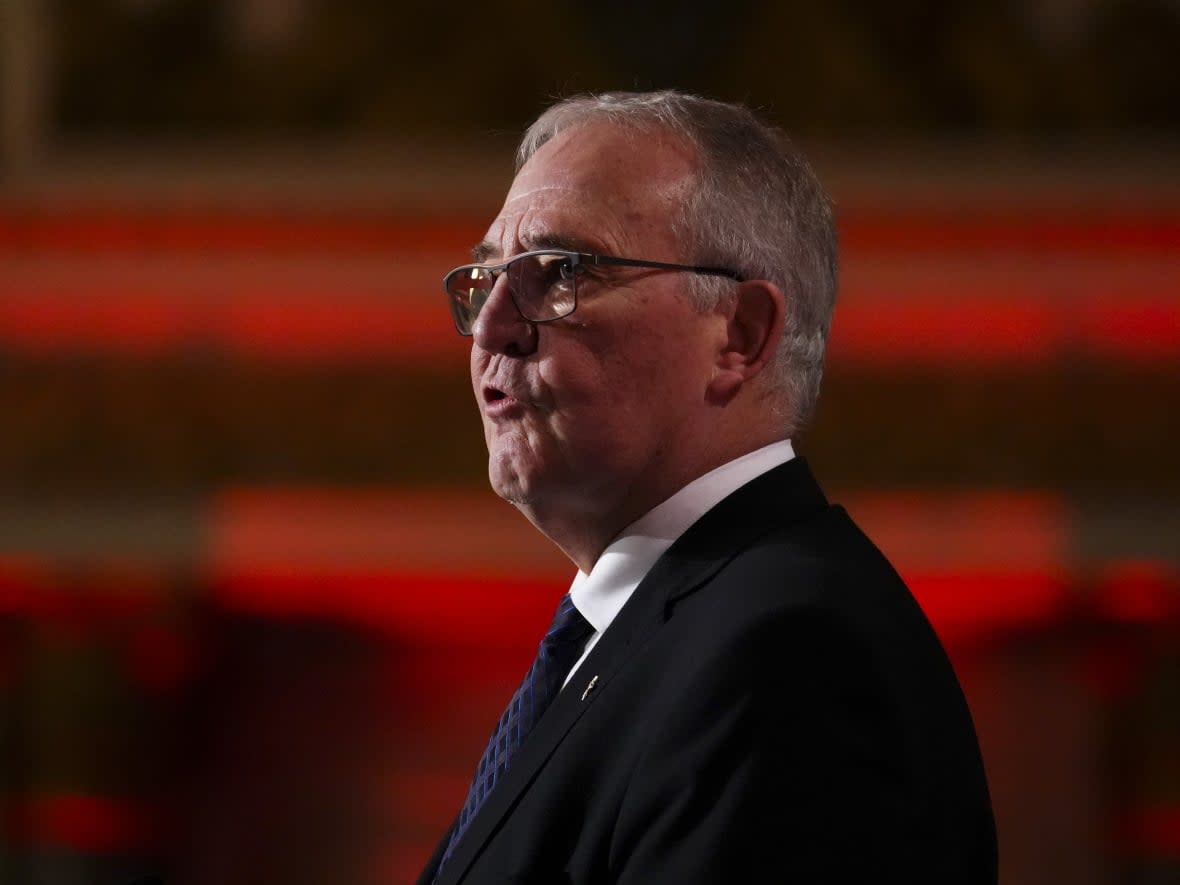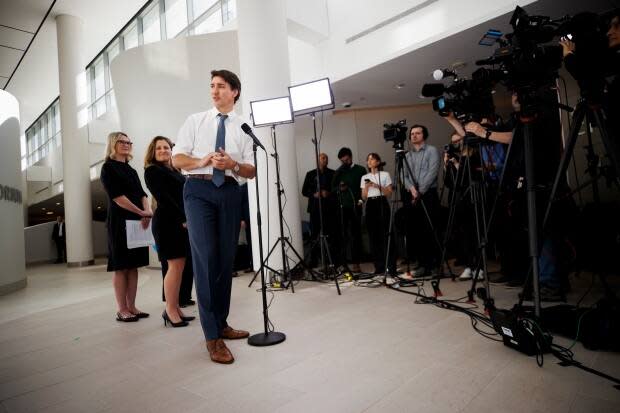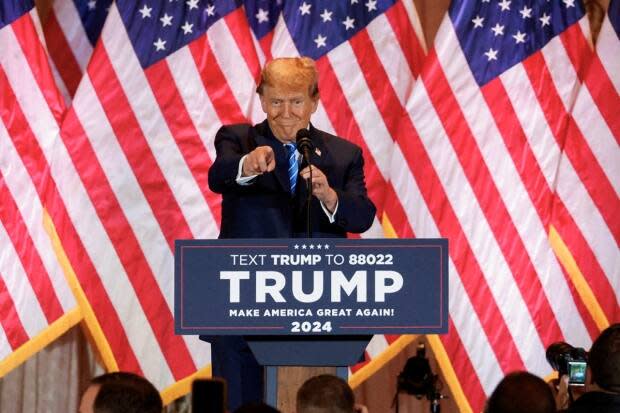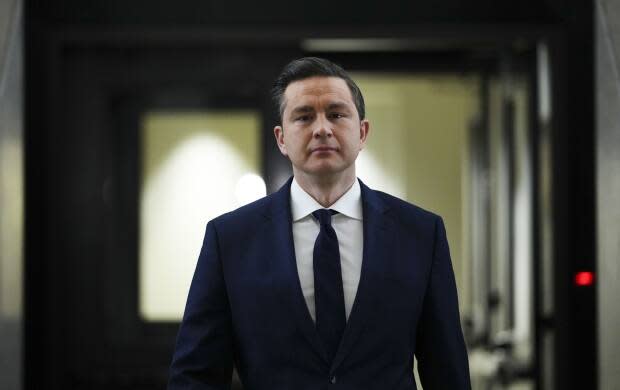As Bill Blair ramps up his warnings about the state of the military, Trudeau sticks to his script

- Oops!Something went wrong.Please try again later.
There's a school of thought that suggests it's never a good idea to disagree with your boss, at least in public.
Behind closed doors? Maybe.
But in front of an audience of hundreds of people, many of them with strong political views? Maybe not.
Defence Minister Bill Blair still went there Thursday in his keynote speech at the annual Conference of Defence Associations Institute (CDAI) when he chose to address growing unease about Canada's place in the world — and the military's waning capacity to be there in a meaningful way when the call comes from the federal government and allies.
Almost a year ago, the CDAI issued an open letter signed by dozens of this country's former top security officials, military commanders and politicians imploring the Liberal government to take national security and defence more seriously.
In reply, Prime Minister Justin Trudeau pointed out a year ago that there are many demands on the federal government and suggested those who signed the letter were simply lobbying for something that concerns them.
"It's really important for people in these industries to advocate," he said. "Governments are challenged with a whole bunch of priorities that we have to invest in and get the balance right on."
Without naming the prime minister, the head of the CDAI, retired lieutenant-general Guy Thibault — himself a former vice-chief of the defence staff — insisted at the opening of the conference on Thursday that matters of national security and defence are not special interests.
"It was somewhat disheartening to see senior folks refer to the message and the authors simply as lobbyists and just another special interest group pushing on the government to increase spending for their particular cause," said Thibault.
"I think sometimes this kind of reaction generates a bit of ambivalence and indifference towards national defence and the Canadian Armed Forces in our society at large."
WATCH: Leaked document says Canada's military capacity is dwindling
Blair was not ambivalent in his response once he got to the podium. He said he disagreed "completely" with "the dismissal of some as lobbyists and business interests."
He acknowledged the military faces a "death spiral" on recruitment and said it's completely "unacceptable" that — as CBC News reported on Wednesday — almost half of the military's equipment is considered "unserviceable" and only 58 per cent of personnel could respond if NATO called in a crisis.
The prime minister, meanwhile, stuck to his well-worn lines when asked about the state of readiness within the military by pointing to the budget increases that have happened since the Liberals assumed power a decade ago.
"These are things that we have stepped up on," Trudeau said at an event Thursday at the Women's College Hospital in Toronto.

It would be a gross overstatement to say there's a wedge between Blair and Trudeau. But that moment at the CDAI conference was a subtle indication of the faultlines that are developing around collective security and defence in this country.
And that wasn't the only fissure to appear this week.
Defence and foreign policy experts say the government appears increasingly out of step with emerging public concern about the wars raging outside the country's borders and the potential for worse things to come.
Three new public opinion surveys suggest a growing number of Canadians are anxious about the state of the country's military, and about Republican presidential candidate Donald Trump's threats to abandon allies who don't invest more in defence.

One of those surveys, by the Angus Reid Institute, suggests a growing number of Canadians — 29 per cent — are choosing military preparedness and the country's place on the world stage as their top political priorities. That figure was just 12 per cent almost a decade ago.
All three surveys point to growing support for higher defence spending and for meeting NATO's defence spending benchmark of two per cent of gross domestic product.
Canada still hasn't publicly committed to hitting that target, putting it uncomfortably out of step with most of its allies.
Of all of the cracks that appear to be developing, the public opinion surveys appear to be the most significant, said Canada's former ambassador to NATO Kerry Buck.
"I think it puts the current government and the opposition out of step with what Canadians are expecting," said Buck.

Federal Conservatives have committed only to "working towards" the NATO target, not to meeting it — which was a hallmark promise of the government of former prime minister Stephen Harper.
"I'd like to see an all-party discussion about the current security environment," said Buck. "I'd love to see a national security strategy, love seeing integrated foreign policy strategy. I think they're all out of step."
Retired vice-admiral Mark Norman said he believes Canadians have been understandably focused on a number of other personal and societal challenges, and the polls may represent a turning point.
"I'm encouraged," Norman said.
But he warned politicians against falling into the trap of doing something just because the polls suggest it would be popular.
"We need to do it because it's the right thing to do," he said. "We need to do it because the government has an obligation to do it. We need to do it because we've told our allies we would do it.
"And fundamentally, we need to do it because the world in which we are living is not the world that we thought it was."

